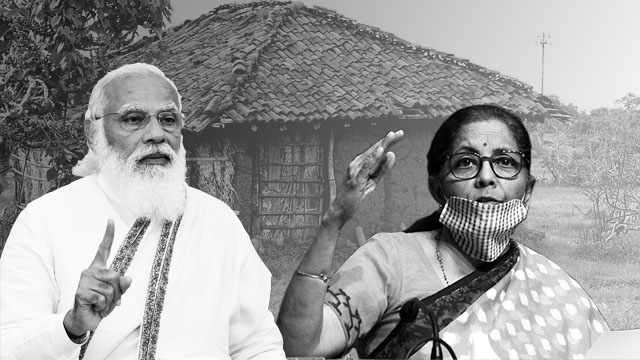
SVAMITVA scheme: A debt trap for farmers that can’t be ignored
Conforming to Prime Minister Narendra Modi’s neo-liberal economic agenda, Nirmala Sitharaman’s Union Budget 2021-22 exhibits hostility towards India’s farmers and rural communities. Apart from firmly supporting Modi’s three contentious farm laws that sparked nationwide farmers’ protest, this budget also mentioned the Survey of Villages Abadi and Mapping with Improvised Technology In Village Areas (SVAMITVA) scheme and increased rural credit target for the financial year (FY). Now, what’s the SVAMITVA scheme and why it’s a threat to India’s farmers and rural communities?
Modi launched the SVAMITVA scheme under the Ministry of Panchayati Raj in April 2020 to provide rural households credit against their residential properties. Under this scheme, demarcations of rural abadi (population) areas are to be done through drone-driven aerial surveys and accurate land records are to be prepared for rural property records. In October 2020, Modi distributed the first batch of property cards under the Scheme. Sitharaman declared in her budget speech that while around 180,000 property owners in 1,241 villages have received the property cards, the scheme will be now extended to all states and union territories.
The website of SVAMITVA scheme claims that as of February 6th 2021, out of 114,518 villages, property cards are prepared for 1,644 villages, ie, 1.44%, and distributed in 1,420 villages, ie, 1.24% villages. Sitharaman’s budget 2021 has increased rural credit target for the FY 2021-22 to Rs 16.50 trillion, which exposes a very obnoxious agenda behind this sudden penchant for rural credit. The idea isn’t really to increase the availability of easy-to-repay and simplified institutional credit for the farmers, rather, it’s a move that aims to increase consumerism in the rural areas to boost the profiteering prospects of the corporate houses.
So far, only the rich and some middle farmers availed the benefits of institutional credit under the Kisan Credit Cards (KCCs) offered by the public sector banks (PSBs). The KCCs, hitherto, had a set of restrictions as they couldn’t be used for any non-farming expenses. Moreover, to get a KCC one had to undergo a lot of documentation at the PSBs and the cooperative bank credit remained elusive for most small and marginal farmers. To make credit lucrative and available, the Modi regime is now liberalising the KCC norms under the garb of increasing credit flow to the rural areas. This will allow the farmers to mortgage their land, houses, etc, for liquid cash easily and they will fall in a vicious corporate trap. With this availability of liquidity, the demand for industrial goods and services will shoot up significantly in rural areas, however, pushing the farmers into an abysmal crisis.
So far, the farmers couldn’t mortgage their residential property to avail credit from PSBs and other institutions if they fall in Panchayat areas. Now under SVAMITVA scheme and Sitharaman’s budget provisions, the rural community will be able to mortgage their residential properties to avail emergency credit. As the rural economy of India is extremely credit-dependent, which has been pushing the farmers into a vicious cycle of unending poverty and destitution, there will be a far larger demand for credit against residential properties. As the corporate houses will tighten their grip over agriculture and boot out the farmers from their land over a period, the promotion of hyper-consumerism in rural India to push up demand for industrial goods will also throw most of the farmers out of their residential properties. Landless and homeless, that’s Modi’s model farmer.
This will allow large-scale real estate giants, big agro product companies, etc, to establish their unchallenged hegemony over the rural economy in connivance with big feudal landlords, usurers and PSBs. The hastening of the doom of the farmers through the SVAMITVA scheme is something that’s not discussed in the press or public discourses. It’s important to reveal how this land-mapping of villages, allowing the mortgaging of residential properties and the increase of rural credit will impose heavier burdens on the Indian farmers. This will eventually end into a major economic catastrophe unless it’s effectively resisted now. The demand for a humane, swift and hassle-free farm credit system must be raised but the attempts to turn the farmers into flotsams must be actively resisted.
An avid reader and a merciless political analyst. When not writing then either reading something, debating something or sipping espresso with a dash of cream. Street photographer. Tweets as @la_muckraker

